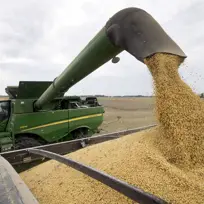China has halted its soybean purchases from the United States, turning instead to Latin America. With the 2026 midterm elections on the horizon, this move puts political and economic pressure on President Trump’s key rural support base.
Soybeans sacrificed in Trump’s China gamble

Key Takeaways:
- China is utilizing its soybean imports to exert trade and political pressure.
- The freeze on U.S. soybean purchases directly affects American farmers.
- The timing aligns with the 2026 midterm elections, impacting GOP constituencies.
- Latin America, particularly Brazil and Argentina, benefits from China’s shift.
- This situation illustrates the tactical use of agricultural imports in geopolitics.
China’s Freeze on U.S. Soybeans
China has decided to halt purchases of U.S. soybeans, a move widely seen as a strategic response to President Donald Trump’s trade policy. The freeze arrives as the 2026 midterm elections loom, heightening its political impact. According to the original report, China is weaponizing its immense agricultural import capacity to directly target the president’s economic and political strongholds.
The Fallout for American Farmers
U.S. soybean farmers are especially vulnerable to shifts in global demand, given that China has traditionally been one of their largest buyers. With the Chinese market suddenly off-limits, many American growers face mounting uncertainty. Rural communities that form a significant part of the GOP’s voter base find themselves under pressure as previously reliable export markets disappear.
A Strategic Shift Toward Latin America
Instead of sourcing soybeans from the United States, China has started to purchase more from Brazil and Argentina. These countries, already known for their robust agricultural sectors, stand to expand their market share at the expense of American suppliers. By diversifying imports away from the U.S., China demonstrates how a targeted trade strategy can accelerate broader shifts in the global soybean market.
Possible Political Repercussions
Because the freeze coincides with the run-up to the 2026 midterms, the impact reaches beyond economic concerns. Farmers affected by declining exports may reassess their political options. China’s actions show how agricultural imports can become powerful levers in international disputes, illustrating that trade policy moves can carry substantial domestic political consequences.











